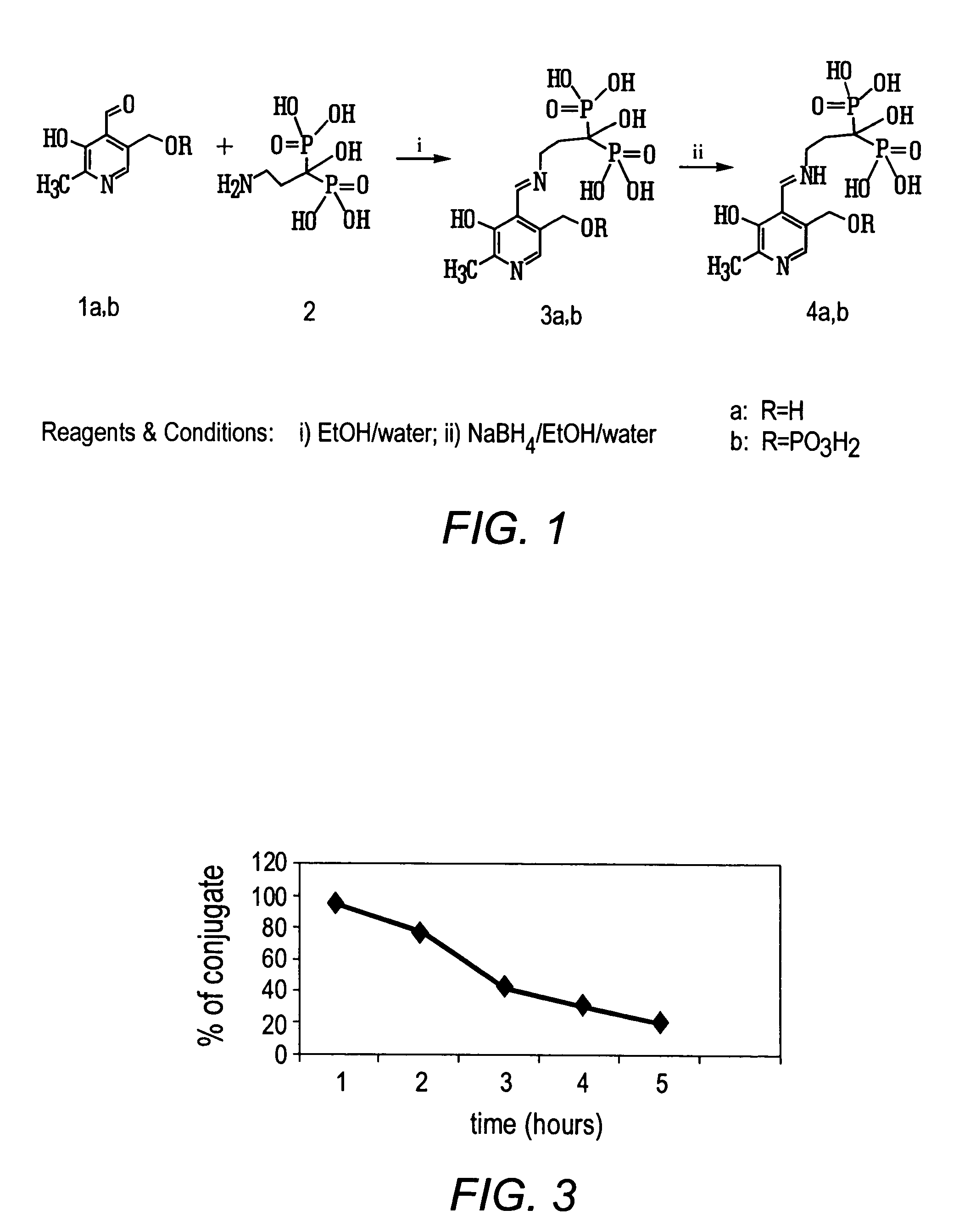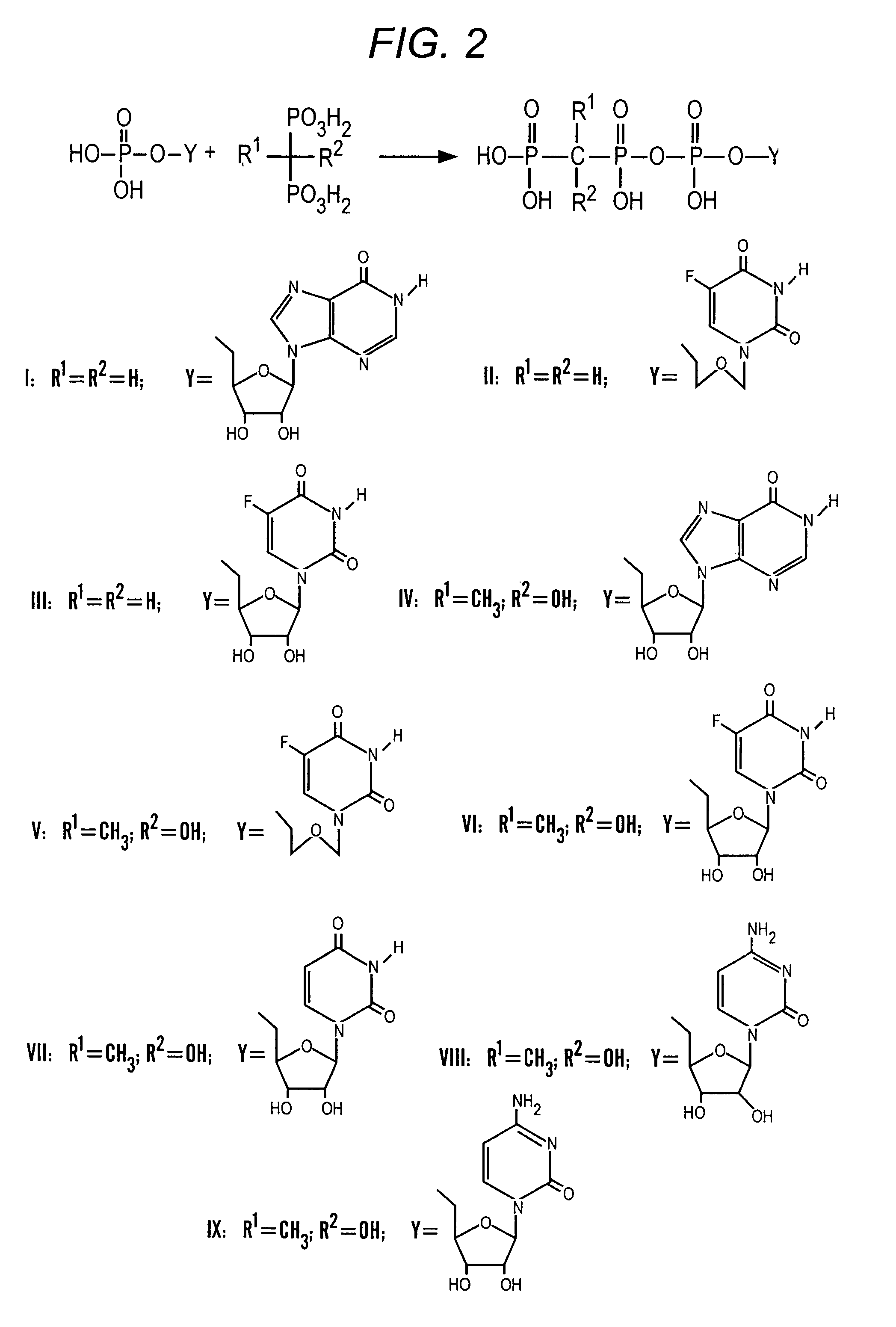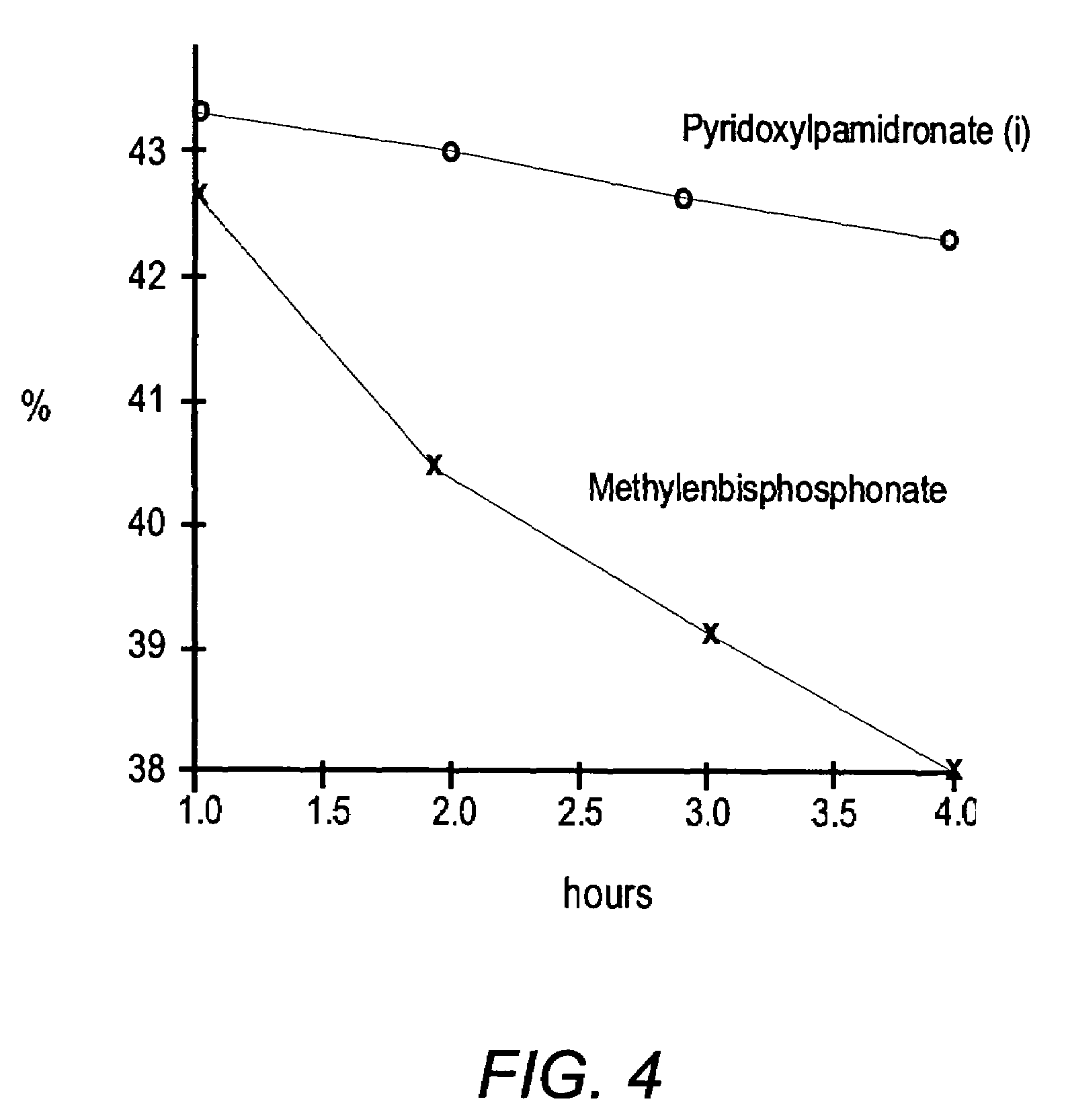Bisphosphonate conjugates and methods of making and using the same
a technology of bisphosphonate and conjugates, applied in the field of bisphosphonate conjugates, can solve the problems of severe side effects, difficult treatment of bone degeneration diseases, including paget's disease and osteoporosis, and bisphosphonate therapies have often been accompanied by severe side effects, so as to promote bone growth and bone marrow proliferation
- Summary
- Abstract
- Description
- Claims
- Application Information
AI Technical Summary
Benefits of technology
Problems solved by technology
Method used
Image
Examples
example 1
Synthesis of 3-amino-1-hydroxypropyliden-1,1-bisphosphonic acid
[0073]To a mixture of 12.3 g (0.15 mol) phosphorous acid, 8.9 g (0.1 mol) beta-aminopropionic acid and 50 ml chlorobenzene 33.0 g (0.24 mol) PCl3 was added dropwise under stirring at 100° C. The two-layer mixture was heated at 105-110° C. for 2 h Under those conditions the bottom layer became thick and finally became solid. The reaction mixture was cooled down to 60-65° C. At this temperature 20 ml of water was added drop by drop. The layers were stirred for 15 min., cooled down to room temperature and then separated. The bottom aqueous layer was filtered through paper filter. 100 ml of isopropanol was added to the solution dropwise (60-65° C.) under stirring. The warm solution was filtered and 100 ml of ethanol was added. After 12 hours at room temperature, a precipitate was filtered off generating a yield of 12.7 g (62%) m.p. 232-234° C. To obtain a homogeneous product the solid material was boiled with 50 ml of water ...
example 2
Synthesis of 3-(N-pyridoxylamino)-1-hydroxypropyliden-1,1-bisphosphonic acid
[0074]To the solution of 189 mg (1 mmol) 3-amino-1-hydroxypropylidene-1,1-bisphosphonic acid in water (1 ml), triethylamine (0.9 ml) and ethanol (9 ml), pyridoxal hydrochloride (408 mg, 2 mmol) was added. The reaction mixture was stirred 1 h at room temperature. Then the pH of a solution was adjusted to 3 with 6 N HCl. Ethanol was evaporated and the pH of the solution was adjusted to 7 with NH4OH. The solution was applied to a Dowex-50(H+) column (20 ml). The column was washed with water and the product was eluted with 2.5% NH4OH. The solution was evaporated to a small volume, the residue was dissolved in water (100 ml) and applied to a DEAE-cellulose column (HCO3 form). The column was washed with water (200 ml) and then eluted with the use of a linear gradient NH4HCO3 (0.05-0.3 M). The peak eluate was evaporated and the residue coevaporated with water (5×10 ml). Lyophilisation of the aqueous solution afford...
example 3
Synthesis of 3-(N-[5′-phospho]pyridoxylamino)-1-hydroxypropyliden-1,1-bisphosphonic acid
[0076]3-Amino-1-hydroxypropylidene-1,1-bisphosphonic acid (940 mg, 4 mmol) was added to the solution of pyridoxal hydrochloride (1.632 g, 8 mmol) in ethanol (40 ml), triethylamine (4 ml), water (4 ml). The reaction mixture was stirred 3 h at room temperature. NaBH4 (300 mg, 8 mmol) was added to the solution and reaction mixture was stirred 1 h at room temperature. The crystalline material was filtered off, washed with ethanol and ether. The product obtained was dissolved in 20 ml water and applied to a Dow-50 (H+) column (30 ml). The column was washed with water and the product was eluted with 2.5% aqueous NH4OH. The solution was evaporated to small volume. Lyophilisation of the water solution afforded product as ammonium salt, yield 875 mg, 52.5%. Rf 0.07 (B); Rf 0.21 (C); Rf 0.2 (D); Rf 0.48 (F); Rf 0.07 (E)
[0077]1H NMR (D2O) δ: 7.38, s (1H, 6-H); 4.13 (2H, 5-CH2); 3.18 t (2H, 4-CH2); 2.23 s (3...
PUM
| Property | Measurement | Unit |
|---|---|---|
| pH | aaaaa | aaaaa |
| temperature | aaaaa | aaaaa |
| temperature | aaaaa | aaaaa |
Abstract
Description
Claims
Application Information
 Login to View More
Login to View More - R&D
- Intellectual Property
- Life Sciences
- Materials
- Tech Scout
- Unparalleled Data Quality
- Higher Quality Content
- 60% Fewer Hallucinations
Browse by: Latest US Patents, China's latest patents, Technical Efficacy Thesaurus, Application Domain, Technology Topic, Popular Technical Reports.
© 2025 PatSnap. All rights reserved.Legal|Privacy policy|Modern Slavery Act Transparency Statement|Sitemap|About US| Contact US: help@patsnap.com



